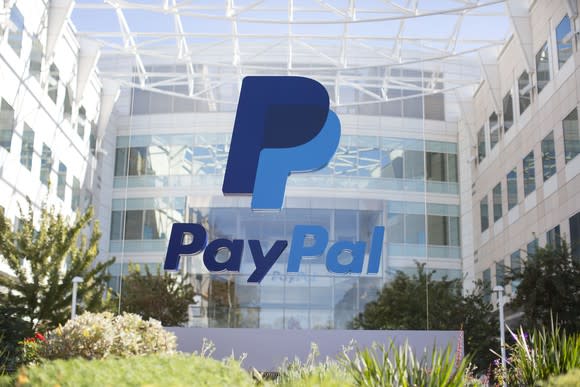1 Thing That Sets PayPal Apart From the Competition
PayPal (NASDAQ: PYPL) has built a huge network of consumers and merchants using and accepting its payment service. But as more sales shift to digital, the company faces an increasing number of threats from newer companies, established fintech companies, as well as banks and credit card issuers themselves.
But there's one thing that gives PayPal a layer of protection from all of those threats. Shoppers who use PayPal have already created a wallet with all of their payment cards. What's more, banks are increasingly encouraging their customers to add their credit cards to PayPal, strengthening the competitive advantage PayPal's wallet provides.

Image source: PayPal.
Make checkout easier
The entire point of payment services like PayPal is to make checkout easier. To that end, PayPal does an excellent job; it converts shoppers into paying customers at a rate 82% higher than all other payment options. More importantly, it converts 60% better than other digital wallets.
The higher conversion rate was likely helped by PayPal's relatively recent change of tune on providing its users with more options. PayPal previously forced users to use their existing balances and defaulted payments to bank accounts, which have significantly lower processing fees than credit cards. But after a series of deals with payment networks, PayPal now offers greater flexibility and ease of use in how customers pay for things online.
Such a high conversion rate compared to its direct competitors gives merchants a greater incentive not only to add PayPal as a payment option, but to highlight it. That leads to a virtuous cycle. As shoppers see PayPal accepted by more merchants, they have more reasons to sign up and use it. As more shoppers use PayPal, merchants have more reasons to add it as a payment option.
Fat wallets getting fatter
A pleasant side effect of being the leading digital wallet company is that credit card issuers want consumers to add their cards to PayPal. Since PayPal changed its stance on default payment options to include credit cards, issuers have been incentivizing customers to add their cards to PayPal. Incentives can range from cash back for making purchases through PayPal to being able to redeem rewards points through the payment platform.
The move benefits both issuers, which see their cards used more often, and PayPal, which adds more payment options for its users. Best of all, it doesn't cost PayPal anything, as all the incentives are paid out by the credit card issuers.
Meanwhile, PayPal is infiltrating other digital wallets. PayPal has partnered with companies like Alphabet's (NASDAQ: GOOG) (NASDAQ: GOOGL) Google and Samsung (NASDAQOTH: SSNLF) to make itself a payment option in their digital wallets.
These partnerships make sense from a strategic sense, too. PayPal may increase the usage of its partners' digital wallets, which would enable Google to collect more data on shoppers that it can later use to target advertisements. Samsung, meanwhile, uses Samsung Pay as an incentive for consumers to buy its high-end smartphones. Neither Google nor Samsung is looking at digital payments as a profit center like PayPal, so they're happy to pass along payment processing fees to PayPal in exchange for attracting more users to their respective platforms.
As PayPal users gain more incentive to add various payment options to their accounts, PayPal becomes an increasingly powerful force in digital payments. That gives it the ability to attract more merchants to its platform and increases leverage when it comes to forming partnerships with other digital wallet companies. That creates a competitive advantage that's hard to overcome for companies just getting into the space, even if they're established payment networks or banks.
More From The Motley Fool
Suzanne Frey, an executive at Alphabet, is a member of The Motley Fool's board of directors. Adam Levy owns shares of Alphabet (C shares). The Motley Fool owns shares of and recommends Alphabet (A shares), Alphabet (C shares), and PayPal Holdings. The Motley Fool has a disclosure policy.

 Yahoo Finance
Yahoo Finance 